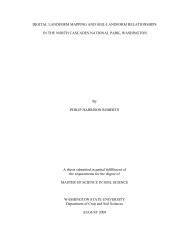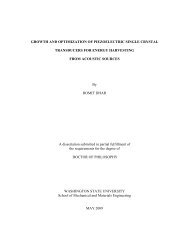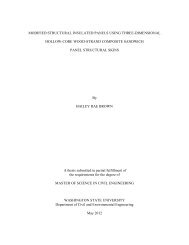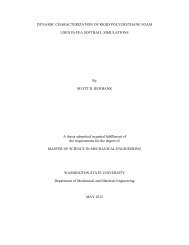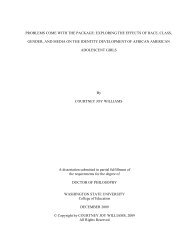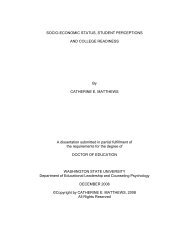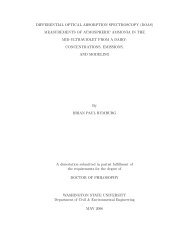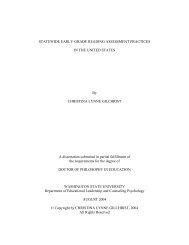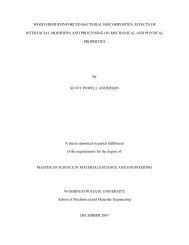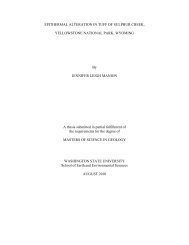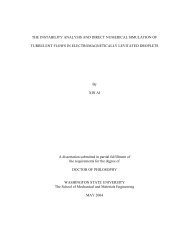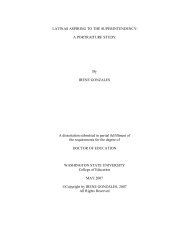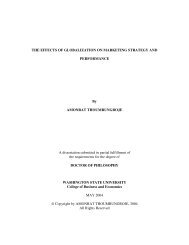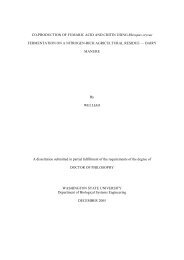the moral reasoning of student athletes and athletic training students
the moral reasoning of student athletes and athletic training students
the moral reasoning of student athletes and athletic training students
Create successful ePaper yourself
Turn your PDF publications into a flip-book with our unique Google optimized e-Paper software.
consistent set <strong>of</strong> <strong>moral</strong> principles when faced with a dilemma. (Beller & Stoll, 2003; Beller,<br />
Stoll, Refvem, Williams, Hanson-Taylor, in review; Beller, Stoll, Williams, Taylor-Hanson, in<br />
review). In <strong>the</strong>se studies <strong>athletic</strong> <strong>training</strong> <strong>student</strong>s in several Division I universities have scored<br />
no differently when compared to <strong>the</strong>ir <strong>student</strong> athlete peers on instruments used to measure<br />
<strong>moral</strong> <strong>reasoning</strong>. In <strong>the</strong>se studies, both <strong>student</strong> <strong>athletes</strong> <strong>and</strong> <strong>athletic</strong> <strong>training</strong> <strong>student</strong>s have scored<br />
at a level consistent with an ego-centered approach. In o<strong>the</strong>r words, <strong>the</strong>y reason from a<br />
perspective that is mostly concerned with <strong>the</strong>mselves <strong>and</strong> <strong>the</strong>ir own personal needs <strong>and</strong> desires.<br />
Social rules <strong>and</strong> norms have little influence, while norms in sport are used as <strong>moral</strong> justifications<br />
when faced with a dilemma. Although <strong>the</strong>se are small studies, <strong>the</strong>y appear to be some <strong>of</strong> <strong>the</strong> first<br />
that examine <strong>the</strong> general sport <strong>moral</strong> <strong>reasoning</strong> <strong>of</strong> <strong>athletic</strong> <strong>training</strong> <strong>student</strong>s.<br />
Of concern to researchers is that if <strong>athletic</strong> <strong>training</strong> <strong>student</strong>s reason from a similar<br />
perspective as <strong>student</strong> <strong>athletes</strong>, <strong>the</strong>n it may be difficult, if not impossible, for <strong>athletic</strong> <strong>training</strong><br />
<strong>student</strong>s to affect <strong>athletes</strong>’ <strong>reasoning</strong> about <strong>moral</strong> issues, specifically issues surrounding doping<br />
in sport.<br />
In Kohlberg’s Just Community (1975 cited in Rest & Narvaez 1994) he argues that when<br />
we discuss <strong>and</strong> debate with o<strong>the</strong>rs, we challenge each o<strong>the</strong>r, our views are questioned, <strong>and</strong> we<br />
must come up with new, more sound positions taking into account o<strong>the</strong>rs, <strong>the</strong>ir view, <strong>and</strong> societal<br />
laws. The more we are challenged by people at a higher <strong>moral</strong> level, <strong>the</strong> more our viewpoints<br />
shape <strong>and</strong> change thus leading to a new, higher stage <strong>of</strong> thinking. However, if we are surrounded<br />
by like thinking, we are not challenged <strong>and</strong> we do not grow <strong>and</strong> think beyond ourselves. A<br />
concern exists that if individuals engaged in <strong>the</strong> practice <strong>of</strong> intercollegiate sport (whe<strong>the</strong>r <strong>the</strong>y be<br />
medical pr<strong>of</strong>essionals, coaches, administrators or players) reason similarly about general <strong>moral</strong><br />
34



